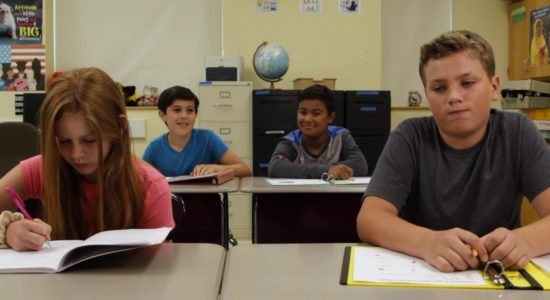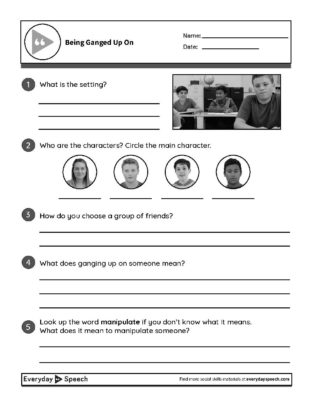Try the no-prep way to teach Handling Teasing and Bullying
Take the prepwork out of teaching essential social-emotional skills with Everyday Speech! Subscribe to access step-by-step curriculum and over 1,000 videos, games, and more.
Preview an SEL skills lesson: Handling Teasing and Bullying

[INTRODUCTION – animated scene. Classroom setting. Teacher sitting at her desk and students having snack inside a classroom]
Narrator: It’s really fun to be in a group of friends. The most important thing about finding a good group is one that likes you for who you are. We want to be careful that our friend group never gangs up on us or is mean to us. Ganging up on someone means a group is working together to manipulate, trick, or tease a person.
Girl 1: (to girl 2) You should take the teacher’s pen.
Boy 1: That’d be funny.
Narrator: If friends are nice to us sometimes and then mean other times, it can be hard to know if they are really your friends. Good friends are nice to you all of the time. (Brain scan icon appears.) One way to tell a group is ganging up on someone is that they are laughing at them or keeping secrets from them.
Girl 1: (whispers to boy 2)
Boy 1: (whispers back to girl 1)
Narrator: They might make the person do work to stay in the group, like do their homework for them or leave recess early to save them a lunch seat. (Brain scan icon appears.) When a group is ganging up on you, they’re showing that they are not nice friends.
Girl 2: (thought bubble) They are not my friends.
Narrator: You’ll want to get a teacher or parent’s advice to figure out what to do. How you’ve been treated will help you and an adult choose your options. An adult who cares about you will help you decide what’s best for you in this situation. One option is talking to the group so they see your side.
Girl 2: (thought bubble) Don’t get me in trouble.
Narrator: Another option is leaving the group and not being friends with them anymore.
(Girl 2 leaves girl 1 and boy 1 and is now friends with boy 2.)
Narrator: A third option is changing who you are close with. You might be friends with some of the people in the group, but not all of the people. You might just hang out with the group in certain situations.
(Girl 2 shows she’s hanging out only with boy 2 but not with the rest of his friends.)
Narrator: An adult who cares about you will help you decide what’s best for you in this situation.
Girl 2: (approaches teacher) Can I talk to you about a friend problem?
Teacher: Sure, what’s up?
[SKILLS]
Narrator: A group is ganging up on someone if they tease, keep secrets, or make a person work to stay in the group. If you ever get ganged up on, talk to an adult who can help you decide if you should work things out with the group, leave the group, or choose to be friends with some people in the group. Let’s see what Niko does when he realizes he’s being ganged up on.
[SCENE 1 Classroom]
Niko: Hey guys. Ready for class?
Andy: Yeah, if you have the math homework done for us.
Niko: I’ve given you my math every day. You’re not going to know the material.
Andy: Oh no, we won’t know the material!
Shay: We need the science questions too.
Niko: I have the math done, but the science isn’t done yet.
Andy: Just do it while we’re copying off your math. Come on, we’re still friends, right?
Niko: I don’t think I want to give you my homework anymore.
(Boy 1 stands up and approaches teacher)
Niko: Mrs. Brunell, can I talk to you about something?
Mrs. Brunell: Sure. What’s up?
Niko: Well, Shay and Andy keep copying my homework.
Mrs. Brunell: Why are you giving it to them?
Niko: Well, they made me. I stopped now but I thought they were my friends.
Mrs. Brunell: Okay, thanks for telling me. They aren’t being your friend. I’ll talk to them.
Andy: (internal thought) I guess we were kind of mean to Niko. We shouldn’t have made him do our homework for us.
Niko: (internal thought) I’m glad I stopped giving them my homework and talked to Mrs. Brunell. Now I know they were ganging up on me.
Mrs. Brunell: I’m glad Niko told me about the situation. I need to talk to Shay and Andy. No one should be ganging up on anyone.
[FROM MY VIEW]
Niko: (voice over) Andy and Shay are always asking me to do things for them. That’s not how friends act. I’m glad I told them I won’t give them my homework anymore. It made me feel better to talk to my teacher too.
[SKILLS REVIEW]
Narrator: Niko knew what to look for in a real group of friends. (Brain scan icon appears.) He figured out this group was ganging up on him and made a plan to ask his teacher to help him decide how to handle it.
[WHAT DID WE LEARN?]
Narrator: So, what did we learn? A group is ganging up on someone if they tease, keep secrets, or make a person work to stay in the group. If you ever get ganged up on, talk to an adult who can help you decide if you should work things out with the group, leave the group, or choose to be friends with some people.
Try Everyday Speech free for 30 days to see all our videos and their companion activities and games!




